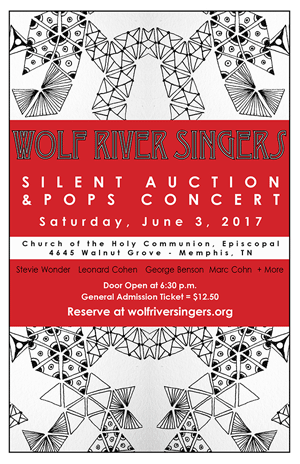A concert 'for the rest of us' - Dec 10-11
If you’re a Seinfeld fan, you probably remember “Festivus - a holiday for “the rest of us.” The December Wolf River Singers concert follows along that line with a program for all of us.

It’s got your basic Christmas music covered – with some old, some new, and some reinvented. In fact, a favorite theme of WRS Director Ben J. Legett is taking the familiar and reinventing it. That’s evident in his version of “What Child is This?” where, with some harmonies that are a little unsettling, he explores an imagined context of someone — but whom? — asking about this child. Why is this child in this setting, this animal barn? With some back and forth between the women’s and men’s sections you get the earthly question with the divine answer: It is Christ the King.
The singers also pay homage to Hildegard von Bingen, or as she’s known in Catholic circles, Saint Hildegard of Bingen. She was somewhat of a “reinventor” too – she pushed the boundaries of acceptable music back in her day (she died in 1179), even inventing her own language for some of her pieces. The singers perform “O frondens virga,” which covers her favorite subject, the Virgin Mary. "O frondens" was arranged by Drew Collins on a melody and text by Hildegard.
Two more pieces from Hildegard’s day take Christmas carols back to their true roots:
"Quem pastores laudavere" ("He whom the shepherds praised"), a 14th century carol with words by Praetorius (1607), and arranged by Susan LaBarr..
Coventry Carol, a 16th century traditional carol, arranged by Darmon Meader.
So you don’t get too lost in the middle ages, there are familiar pieces too — Dashing Through the Snow, White Christmas, Bring A Torch and more.
Moving away from Christmas, we turn to Chanukah with Adonai Ro’I, the 23rd Psalm sung in Hebrew. Okay, that’s not really a Chanukah song. Okay, it’s not a holiday song, either. But it is a time of year when we typically remember people we’ve lost along the way and this is a song often sung at Jewish funerals. In fact, composer Gerald Cohen, a Jewish cantor, wrote the melody for a funeral of a dear friend. He later was asked by the Zamir Chorale of Boston to write a version for SATB chorus.
Borukh Ate, Zingt Der Tate is a Yiddish Chanukah song written in 1921, by Solomon Golub and Abraham Reisen. The text describes a father chanting the blessings over the Chanukah Menorah. This arrangement is part of the Judith Clurman Choral Series.
And, lest we forget the Druids, we’ve included John Purifoy’s “Solstice.” The Druids, in case you’re wondering, don’t celebrate Christmas or Chanukah, but their festival of Midwinter begins with ceremonies at the winter solstice, between Dec. 20-23. Publisher Hal Leonard doesn’t really give a shout out to the Druids, but does say the piece depicts “a sense of awe and mystery … as well as our unique connection to nature, the earth, the sun and the movement of the spheres.”
So however you like to celebrate the holiday season, we've probably included something in this concert to get you off to the right start.
Come join us!
Church of the Holy Communion - Episcopal 4645 Walnut Grove Rd, Memphis, TN 38117 Saturday December 10, 7:30 p.m.
Our Lady of Perpetual Help 8151 Poplar Ave, Germantown, TN 38138 Sunday December 11, 3 p.m.




